
Learning to fly RC airplanes is a step by step process. First, you learn one control and then you move on to the next. Before you know it, you’ve masters the four basic controls: throttle, elevator, rudder, and ailerons. Once you try your hand at flying a scale subject, you’ll be introduced to another set of controls in the form of the flaps. Since most full-size aircraft use then, many scale models include them for true scale flight performance. If you have never flown a model equipped with flaps, there are a few things you’ll need to know. There are right ways and wrong ways to use them and this article should help you understand the fundamentals.
Overall, when flaps are lowered they change the wing’s lift and drag characteristics and in so doing, lower the stall speed. By changing the camber of the wing, both lift and drag are increased for a given airspeed. As a result, the speed at which an aircraft can land is affected. If you have never flown with flaps before, don’t worry. Flaps add flexibility to your model’s flight envelope, and they offer a fun new experience.
PLAIN FLAPS
Though there are four basic types of flaps: plain, split, Fowler, and slotted, the plain flap is the most common and is simply a hinged portion of the trailing edge. Usually hinged at the top of the control surface, plain flaps deflect in a downward direction. Cubs and other sport scale models use plain flaps to keep construction and function simple.
The major advantage of flaps is that they shorten (and steepen) your landing approach by allowing your model to fly more slowly while in a nose-down attitude. Here are some helpful hints.
DOs
Learn how your plane reacts to flaps at a safe altitude before attempting your first landing.
Reduce the throttle to around 1/3 and let the plane slowly before dropping the flaps.
Denne historien er fra January 2020-utgaven av Model Airplane News.
Start din 7-dagers gratis prøveperiode på Magzter GOLD for å få tilgang til tusenvis av utvalgte premiumhistorier og 9000+ magasiner og aviser.
Allerede abonnent ? Logg på
Denne historien er fra January 2020-utgaven av Model Airplane News.
Start din 7-dagers gratis prøveperiode på Magzter GOLD for å få tilgang til tusenvis av utvalgte premiumhistorier og 9000+ magasiner og aviser.
Allerede abonnent? Logg på
Legend Hobby / Seagull Models - Cessna Grand Caravan 208
The Cessna Grand Caravan 208 is a legend in aviation circles. A single engine utility aircraft that punches up with capabilities that rival many twin engine aircraft in its class. Its seemingly simple configuration belies its near extreme utility.
PROPER CG LOCATION FOR AEROBATICS
If you are getting into aerobatics and are starting to perform more advanced maneuvers, it is time to discuss ways you can not only become a better pilot, but how you can also improve the flight characteristics of your airplanes.
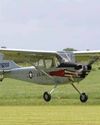
Legend Hobby 13-Foot L-19 Bird Dog/ Cessna O-1
This famous multi-mission single engine observation aircraft served from 1950-1974. From calling out target locations to providing intel/recon information, the Bird Dog was a valued asset in both the Korean War and Vietnam.
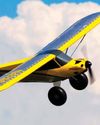
EARN YOUR WINGS
10 Tips for First-Flight Success
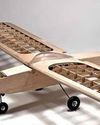
Old School Model Works Fifty Six
The Fifty Six takes its design cues from the original .09- to .15-size Carl Goldberg Falcon 56 of the 1960s. Reworked to incorporate modern, lasercut techniques to make kit building better than ever.
FLYING TWINS Multi-engine warbirds made easy
Let’s face it, there’s just something extra special about twin-engine RC aircraft. Most modelers stop what they’re doing when a twin fires up on the flightline.
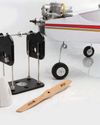
HOW TO BALANCE PROPELLERS
Four easy steps to increase performance and reduce vibration
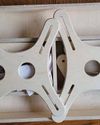
PRODUCT REVIEW: RC PLANE STANDS BENCHTOP MODEL
I’m a sucker for shop stuff. I buy tools I will probably never use just because they are cool, or I might need to use them someday. When Glen from RC Plane Stands reached out about a review, however, I knew as soon as I browsed their website that I would be receiving something I would use a lot, maybe even daily.
SPIRIT OF RHINEBECK AWARD WINNER
A close up of Norman Malinowski’s 1/3-scale Albatros
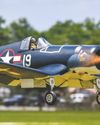
CENTER OF GRAVITY BASICS
The secret to a plane that flies well